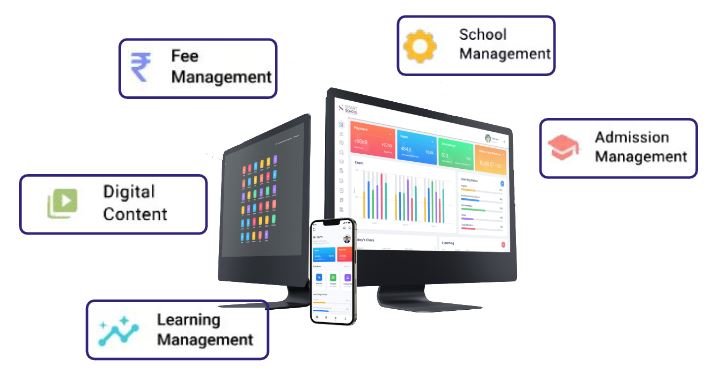In today’s fast-paced world, educational institutions are under a lot of pressure to manage complex operations efficiently. From student records and finances to human resources and communication, schools handle a vast amount of data and processes.
This is where Enterprise Resource Planning (ERP) systems come into play, offering a powerful solution to streamline operations and enhance overall efficiency. This blog post will go on to define what an ERP system is and explore the significant benefits it can bring to schools of all sizes.
What is an ERP System?
An Enterprise Resource Planning (ERP) system is the integrated software that centralizes and automates various business processes within an organization. It essentially acts as a hub, connecting departments and functions to each other with a shared database. This ensures smooth data flow, improved communication, and efficient decision-making processes.
Traditionally, schools have relied on disparate systems for different functions – a student information system (SIS), a financial management system, a library management system, and so on. This siloed approach often leads to data duplication, inconsistencies, and communication breakdowns. An ERP system eliminates these issues by providing a single, integrated platform that manages all these functions and more.
Key Components of a School ERP System:
A typical school ERP system has the following modules:
- Student Information System (SIS): This module contains all student-related data, such as demographics, enrollment, attendance, grades, transcripts, and disciplinary records.
- Finance Management: This module deals with all financial transactions, including fee collection, budgeting, accounting, payroll, and financial reporting.
- Human Resource Management (HRM): This module contains all employee data, including recruitment, payroll, attendance, performance reviews, and training.
- Library Management: This module handles the automatic processes of library functions, which includes cataloging, circulation, inventory, and online access.
- Transportation Management: The module oversees the school transport with bus routes, scheduling, and monitoring of students in addition to keeping track of their maintenance.
- Inventory & Procurement Management: The module takes care of all school supplies, equipment, and other assets such as procurement, inventory, and maintenance.
- Communication & Collaboration: The module deals with school staff-students-parents communication and coordination by email, SMS, portal, and more.
- Exam & Assessment Management: This module helps in scheduling exams, generating mark sheets, managing results, and generating reports.
How Can an ERP System Benefit Schools?
An ERP system can benefit schools in a wide range of ways, including:
- Increased Efficiency and Productivity: An ERP system significantly improves efficiency and productivity by automating manual tasks and streamlining work processes. Staff can be free to engage themselves in more strategic activities such as teaching and student support instead of tedious administrative work.
- Centralized Data Management: An ERP system provides a central repository for all school data, eliminating data silos and ensuring data consistency. This makes it easier to access, analyze, and report on data, leading to better decision-making.
- Improved Communication and Collaboration: ERP systems make communication and collaboration between different departments, staff members, students, and parents quite smooth. It enhances transparency, reduces misunderstandings, and fosters a stronger school community.
- Better Financial Management: An ERP system automates financial processes, such as fee collection, budgeting, and accounting, reducing errors and improving financial control. It also provides real-time financial insights, allowing school administrators to make informed financial decisions.
- Improved Student Management: The centralization of student data in an ERP system makes it easier to track student progress, manage attendance, and communicate with parents. It helps schools support students better and improve overall student outcomes.
- Streamlined Admissions Process: An ERP system can automate the admissions process, from online applications to enrollment, making it more efficient and less time-consuming for both school staff and prospective students.
- Improved Reporting and Analytics: ERP systems can offer powerful reporting and analytics that enable schools to track key metrics, identify trends, and make decisions based on data. This would help schools enhance their performance in all areas, from student achievement, financial management, and operational efficiency.
- Lower Operational Costs: Automation of processes, reduction of errors, and improvements in efficiency may help schools cut their operational costs over time.
- Improving Compliance: ERP systems make the school sensitive to complying with different regulations and reporting requirements, such as data privacy and financial reporting standards.
- Improving Parent Involvement: With parent portals and communication tools, ERP systems encourage better communication and interaction with parents to know about their child’s improvement or about school events.
How to Select the Right ERP System for Your School?
Selecting the right ERP system is the key to successful implementation. The following factors need to be considered when selecting an ERP system by schools:
- Specific Needs: What are the specific needs and requirements of your school? What are the key challenges you are trying to address? What functionalities are most important to you?
- Scalability: The system must be scalable according to the growth of your school.
- Integration: Should be able to integrate with all existing systems in the school.
- User-Friendly: A very user-friendly interface that all types of users will like.
- Vendor’s Reputation and Customer Support: Have a reputable company with a good credit and support system.
- Budget: Determine how much money can be spent in the project to get the best investment.
Implementing an ERP system is a significant investment for any school, but the benefits it can bring are substantial. By streamlining operations, centralizing data, and improving communication, an ERP system can help schools improve efficiency, enhance student outcomes, and better serve their communities. You can also choose a cyborg-erp product which is one of the best erp for schools and has all the qualities shown above.
As educational institutions continue to face increasing challenges, ERP systems are becoming an essential tool for success in the modern educational landscape. With careful consideration of their needs and the right choice of system, schools can leverage the power of ERP to transform their operations and meet their goals.
From disparate systems to a unified platform, this shift is not merely a technological upgrade but rather a strategic move towards a more efficient, data-driven, and connected educational environment.
This post was created with our nice and easy submission form. Create your post!




